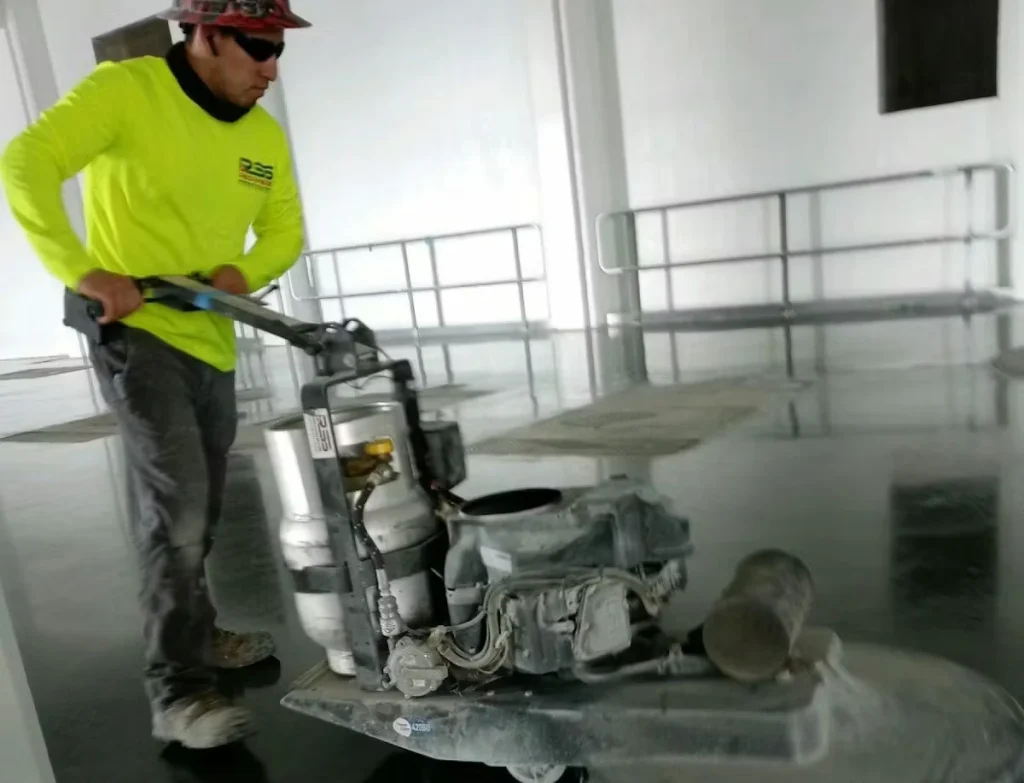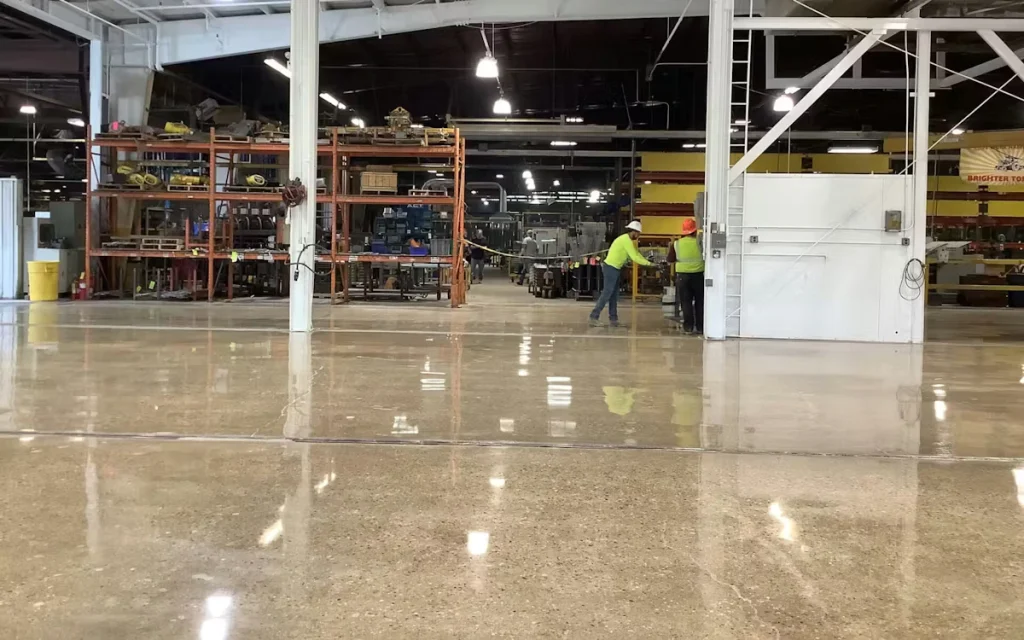
It’s rare to walk through any modern commercial or industrial building and find bare concrete floors. As versatile and durable as it is, concrete also has several less desirable traits, including these five well-known and most common ones:
- Porous as a sponge, ready to absorb and be stained and corroded by any liquids that land on them.
- Vulnerable to temperature swings, causing thermal expansion and contraction that can lead to cracking.
- Susceptible to wear patterns and uneven surfaces, due to activity like heavy and consistent forklift traffic.
- Prone to cracking and spalling (breaking off in fragments) over time and under the pressure of operational use.
- Drab and dark, which makes space less pleasant and safe to be in, affecting everything from worker productivity to customer comfort in commercial facilities like big box stores.
That’s why facility owners and property managers allocate significant time and resources to determine the best way to finish and protect their concrete flooring substrates.
For most types of commercial or industrial facilities, three main options are available:
- Covering like carpet or vinyl.
- Coating systems like epoxy.
- Concrete polishing.
Concrete polishing will be the focus of this article.
Concrete polishing in a nutshell
Concrete polishing is a combination of mechanical and chemical steps, applied in a systematic process that takes skill and experience to master. The mechanical part is grinding and honing with specialized equipment and abrasives; the chemical part is a product called a hardener or densifier. Optimal refinement at each stage is necessary for high quality, durable results, and optimal refinement requires mastery of the three mechanical and chemical components:
- Operation of specialized grinding machines and polishing tools;
- Selection and application of abrasive materials in a variety of coarse-to-fine grit levels;
- Selection and application of chemical additives that densify and seal the concrete.
| Ground concrete | Honed concrete | Polished concrete |
|---|---|---|
| Flat appearance with little to no reflection and low sheen. | Matte appearance with medium reflection and sheen. | High clarity of reflection with glass-like finish. |
When properly installed, a polished concrete floor is very durable and economical, with reduced expenses for care and maintenance.
It bears repeating: Proper installation is key.
Anyone can say they can polish concrete floors and rent the equipment to do so, yet it doesn’t take long for incompetence and lack of experience to cause problems. Unfortunately, many of the problems are not discovered or don’t occur until well after the project is completed.
Benefits of polished concrete

Compressive strength
Polished concrete can provide a high level of surface strength to handle the wear and vibration of heavy traffic and equipment loads. Often the foundation of this comes from the concrete itself, but the polish improves density.
Slip-resistance
Under normally dry conditions, polished concrete floors meet OSHA and other industry standards for coefficient of friction guidelines. While a highly polished surface may look wet, it is not slippery, making it a good option to minimize slips, trips, and falls.
Performance / durability / useful life
This is where concrete polishing really stands out. The process of grinding, honing, and polishing the concrete removes imperfections, restores the surface, and makes the concrete more resilient. Chemical densifiers harden and seal the concrete to further strengthen it. Life cycle maintenance costs are low, and the useful working life is long.
Ease of maintenance
The ease and low cost of routine cleaning and maintenance are a key buying point for polished concrete. Polished concrete resists staining, and makes the surface impervious to the abrasive nature of most cleaning products and processes.
Protection of that big, vital concrete slab
For hardworking industrial facilities, where flooring performance may be the only thing that matters, concrete polishing will protect the surface from the rigors of operational wear and tear. The densification and hardening of the concrete provides a strong, durable finish to maximize the useful lifespan and reduce maintenance downtime.
Visual appeal
Polished concrete is bright and reflective, which not only makes any space look better, but may reduce energy and lighting costs. For design considerations, polished concrete offers an endless array of options. It can be colored with dyes, scored or engraved, embedded with decorative aggregates, or embellished with logos or other graphics.
Support for LEED and other green initiatives
Polished concrete floors can help organizations achieve credit toward LEED certification. They reflect light to help minimize and reduce energy use, last many years for greater sustainability and less replacement, and require very little in the way of raw material consumption.
Challenges of concrete polishing
While polished concrete delivers many benefits and high value, it also presents some difficulties and shortcomings. Contractors that are unaware of these possible “gotchas” or unable to deal with them are unlikely to meet job specifications or client expectations.
Facility conditions and operational requirements
Polished concrete performs wonderfully in many commercial and industrial facilities. Yet for some circumstances, polishing may not be advisable as the best solution:
1. Facilities where chemicals are produced or used regularly
Chemicals will stain and etch into a polished concrete surface over time. Even polished concrete is susceptible to acid and caustic chemicals. Strong chemical resistance is best achieved through specialized performance coatings rather than polishing.
2. Floors that need to meet stringent sanitary or hygiene standards
Facilities like food and beverage processing plants or pharmaceutical facilities operate under a unique set of requirements for their floors and other surfaces. To comply with health department standards and FDA / USDA / SQF requirements, a seamless coating to prohibit bacterial growth and withstand rigorous cleaning chemicals is usually a better fit.
3. Concrete in poor condition
Concrete slabs that are not flat and level, or that have serious cracking and spalling problems, are challenging when it comes to obtaining quality results. A trustworthy, qualified concrete polishing contractor will advise you when a concrete substrate may need more extensive repairs or alternative solutions.
4. Areas better served by coverings
Some facilities or areas are better suited with coverings like tile or carpet, rather than polishing or coatings. Coverings offer warmth, quiet, and softness that may be better for certain buildings and space allocations.
Variables that need to be considered
We have touched on the variables that a concrete polishing contractor needs to combine in the right proportions at the right time for a successful outcome.
1. Within contractor control
Contractors are in control of the selection and use of equipment, the abrasive material, and the chemical densifiers and sealers.
Regarding equipment: Speed, motion, and pressure all affect the grinding and polishing steps. Too much or too little of any will impact everything from surface preparation to sheen specifications. The same applies to the abrasive materials and selecting the right type and grit (fineness / coarseness) at each stage of the process.
Finally, as concrete densifiers have become a de facto standard, choosing the right chemicals and applying them to manufacturer specifications will affect the performance and lifespan of the polished surface.
2. Beyond contractor control and requiring accommodation
When it comes to circumstances we cannot control, the existing condition of the facility in general and the concrete floor specifically goes at the top of the list. The flatness and levelness of the floor, along with the quantity and severity of imperfections, are something we must accommodate. The mix design of the concrete can also be a factor in the equation.
Architectural features like corridors and other tight spaces or columns and other fixed obstacles can add complexity and take more time.
These and other innate features may be beyond the contractor’s control, but they must be considered and incorporated into estimates, bids, and project timelines.
Good flooring contractors overcome all obstacles
It’s the contractor’s job to address and solve these and any other challenges. That’s why you hire professionals. You rely on them to deliver the outcome you want and need, and for the process to go as smoothly as possible, because the downtime clock is ticking.
What you should care about and carefully assess is the experience, skill, and reliability of the concrete polishing contractor. Will they be able to live up to the promise of their bid or proposal? Do they cover job specification details to show their understanding and mastery of the process.
variables? A quality contractor like Painters USA can answer your questions with confidence and provide proof of credentials.
Should you choose polished concrete for your facility?
Polished concrete, in a setting where it’s well-suited, delivers significant benefits and long-term value. The common thread is the ability to turn the concrete foundation slab into an aesthetically pleasing, hard-working floor with a long lifespan and low maintenance needs.
Before choosing polished concrete or any other flooring option, consider the following and anything else that matters to your business:
- Operational requirements.
- Expected working life of the facility.
- Workplace safety.
- Regulatory compliance.
- Downtime constraints
Polishing is one of many options to protect and maintain your concrete floors. When you consider working life, maintenance, and reduction in repair and lighting costs over the life of the floor, it often wins.
As a highly experienced concrete flooring contractor, Painters USA Is happy to share our expertise to help you assess your options and to provide a timely and accurate estimate when you’re ready to proceed.